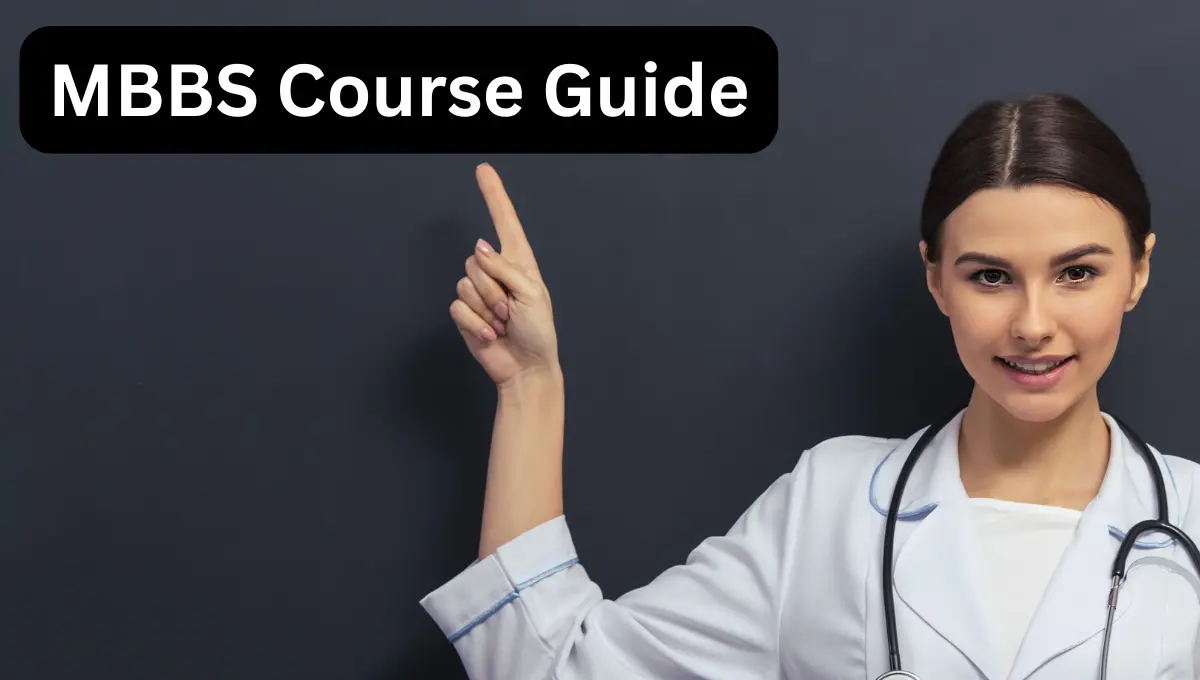The full form of MBBS is Bachelor of Medicine and Bachelor of Surgery. It is one of the most sought-after undergraduate degrees in India for students aspiring to enter the field of medicine. MBBS is a comprehensive program that covers both medical theory and practical training in surgery, providing students with a solid foundation to pursue a career as a doctor.
In India, there are a total of 420 MBBS colleges, out of which 209 are private institutions, while 211 are government-owned. These colleges collectively offer 72,211 MBBS seats across the country, giving students a wide range of options to pursue their medical education.
The MBBS program exposes students to various medical disciplines, helping them gain an in-depth understanding of different areas of medicine. This includes subjects such as anatomy, physiology, biochemistry, pathology, pharmacology, and surgery, among others. As students progress through the course, they can also develop a specific interest in a particular area of medicine, which can help shape their future specialization.
One of the leading medical institutions in India, JIPMER (Jawaharlal Institute of Postgraduate Medical Education & Research), placed 126 students and saw 74 students opt for higher studies during the academic year 2020-21. Similarly, at Christian Medical College (CMC), a prestigious institution in India, the median salary for students who graduated in the same year was approximately Rs. 4 lakhs per annum (LPA), reflecting the strong placement opportunities in the medical field.
With a growing demand for skilled medical professionals, pursuing an MBBS degree offers a wide range of career opportunities, not just in India but globally. Graduates can work in hospitals, healthcare centers, research institutions, or even pursue higher studies in specialized fields of medicine. The MBBS degree is the first step toward building a rewarding career in healthcare, where you can make a significant impact on people’s lives.
For Indian students, pursuing MBBS is a pathway to an esteemed profession, but it requires dedication, hard work, and a commitment to learning. With the right preparation and guidance, you can secure admission to one of the top medical colleges in the country and embark on a fulfilling career in medicine.
What is the Full Form of MBBS?
The full form of MBBS is Bachelor of Medicine and Bachelor of Surgery. In medical terms, it stands for “Medicinae Baccalaureus, Baccalaureus Chirurgiae,” which is derived from Latin. This degree is a five-year-long undergraduate program designed for students who wish to pursue a career in medicine and surgery.
The MBBS program provides a thorough education in medical science, combining theoretical knowledge with practical experience in clinical settings. It is the foundational degree that allows students to become doctors and practice medicine after completing their studies and required training.
Note:-For more details on the Top 10 Medical Courses in India, click here
MBBS Course Details
| Particulars | Values |
| Course Name | MBBS |
| MBBS Full Form | Bachelor of Medicine and Bachelor of Surgery |
| MBBS Course Type | Full-time |
| MBBS Course Level | Undergraduate |
| MBBS Course Eligibility | 10+2 with Physics, Chemistry, and Biology |
| MBBS Course Duration | 5.5 years |
| MBBS Course Fees | Rs. 15,000 to Rs. 90 Lakhs |
| Avg Salary after MBBS Course | Rs. 360,000 LPA |
| Career Opportunities | Physician, Doctor, Endocrinologist, Pathologist, Neurologist, Cardiologist, Gynaecologist |
| Top Recruiters | Apollo Group, Indian Nursing Council, Fortis Hospitals, Manipal Group, Medica |
MBBS Course Fees
The fee structure for an MBBS degree varies greatly depending on the type of institution—whether it is a government or private college. It’s important for students to thoroughly check the fees of the colleges they are interested in before applying. Generally, the fees for MBBS in India can range from as low as Rs. 15,000 per year in some government institutions to as high as Rs. 90 lakhs in private medical colleges. Government colleges usually have more affordable fees compared to private ones, but securing a seat in a government institution is highly competitive.
Why Choose MBBS?
MBBS is one of the most prestigious and competitive courses in India, and admission is based on the rank obtained in the NEET entrance examination. Becoming a doctor is considered a noble and respected profession, making MBBS a top choice for students aspiring to work in healthcare. After completing the MBBS program, graduates have numerous career options in various medical fields and can even choose to specialize in specific areas of medicine.
The successful completion of an MBBS degree opens up a world of opportunities in the healthcare industry. After earning an MBBS degree, students can pursue higher studies such as an MS (Master of Surgery), MD (Doctor of Medicine), or DNB (Diplomate of National Board) in various specializations. Graduates can also pursue careers as general surgeons, endocrinologists, pathologists, neurologists, physicians, ENT specialists, cardiologists, oncologists, and more. These roles are not only highly rewarding but also offer opportunities to make a significant impact on patients’ lives.
Choosing MBBS gives students the chance to build a fulfilling career in a field that is always in demand, offers job stability, and provides the opportunity for continuous learning and growth.
MBBS Eligibility Criteria
Applicants must meet the eligibility criteria for admission to the MBBS degree program. Aspiring candidates need to check all the necessary details, including the eligibility criteria, and the admission process. Below, we have mentioned the MBBS eligibility criteria.
| Particulars | MBBS Eligibility Criteria |
| Eligibility Criteria | At least 50 percent marks in 10+2 with Physics, Chemistry, and Biology and Mathematics |
| Entrance Exam | NEET UG |
| Minimum Age Requirement for NEET | 17 years |
| Qualifying Marks | Unreserved – 50 percent, OBC/ST/SC – 40 percent, PwD – 45 percent |
MBBS Course Duration
The MBBS program has a total duration of five and a half years, which is divided into ten semesters. Out of these, the first four and a half years focus on classroom education and clinical training across various subjects related to general medicine and surgery. After completing these nine semesters, students must undergo a mandatory one-year rotating internship, where they gain hands-on experience in different medical departments such as surgery, pediatrics, and general medicine. While the MBBS degree provides a strong foundation in medical science, students who wish to specialize in a specific area of medicine will need to pursue a postgraduate degree like MD (Doctor of Medicine) or MS (Master of Surgery) after completing MBBS.
Skills Required for MBBS Degree
To excel in an MBBS degree program and build a successful career in medicine, certain essential skills are needed. These skills not only help students during their studies but are also critical for their professional growth. Some of the key skills required for MBBS graduates include:
Patience: Dealing with patients and complex medical cases often requires a calm and composed mindset.
Empathy: Understanding patients’ needs and emotions is crucial for providing effective care and support.
Critical Thinking: Diagnosing and treating medical conditions requires strong analytical and problem-solving abilities.
Physical Strength: The medical profession can be physically demanding, especially during long shifts or surgeries.
Attention to Detail: Precision is essential in diagnosing illnesses, prescribing treatment, and performing surgeries.
Communication Skills: Doctors must be able to communicate clearly with patients, families, and medical teams to provide the best care.
By developing these skills, students will be better prepared to handle the challenges of the medical profession and make a positive impact on the healthcare system.
MBBS Application Process
The admission process for MBBS is fairly uniform across most colleges, though cutoffs may vary. Prestigious institutions like AIIMS Delhi often have higher cutoffs compared to private colleges. Here’s the general process:
NEET Exam: Candidates must fill out the NEET application form with the required details.
Appear for NEET: After completing the form, students must take the NEET exam and secure a qualifying score.
Counseling & Admission: Qualified candidates participate in the counseling process. Once allotted a seat, they complete the admission by submitting fees and relevant documents.
MBBS Syllabus
In this section, we have provided the common MBBS syllabus which is used by many medical colleges in India. The syllabus is divided into five years and is also required to pursue a one-year rotary internship.
MBBS 1st Year Syllabus
MBBS 1st year syllabus covers the introductory subjects of the MBBS degree program. Some of the subjects are Introduction to Medical Practice, Cell Biology, Neuroscience, Basic Haematology, and Respiratory Systems. In the table below we have discussed the MBBS first year syllabus.
| Semester- 1 | Semester-2 |
| Fundamentals of Disease and Treatment | Health and the Environment |
| Introduction to Medical Practice I | Basic Haematology |
| Cell Biology | Healthcare Concepts |
| Locomotor System | Neuroscience 1 (Peripheral System) |
| Introduction to Molecular Medicine | Respiratory System |
| Introduction of Embryology and Histology | – |
MBBS 2nd Year Syllabus
MBBS second-year subjects are general pathology, environmental pathology, neoplasia, alimentary system and cardiovascular system. In the table below we have discussed the 2nd year subjects of MBBS degree.
| Semester-3 | Semester-4 |
| General Pathology | Systemic Pathology |
| Neoplasia | Haematology |
| Hereditary Disorder | Cardiovascular System |
| Environmental Pathology | Alimentary System |
| Nutrition Disorders | Common Symptoms and Signs |
| Immunity | – |
MBBS 3rd Year Syllabus
MBBS 3rd year syllabus covers various subjects, like clinical pathology, immunopathology, epidemiology of communicable diseases and Reproductive and child health. In the table below we have discussed the MBBS third year syllabus.
| Semester-5 | Semester-6 |
| Special Pathology | Epidemiology of communicable diseases |
| Clinical Pathology | Epidemiology of non‐communicable diseases |
| General Pathology | Reproductive and child health |
| Growth Disturbance and Neoplasia | – |
| Immunopathology | – |
MBBS 4th Year Syllabus
MBBS fourth year subjects cover the study of infectious disease, nutritional disease, nervous system emergency medicine and critical care. In the table below we have discussed the 4th year subjects of MBBS.
| Semester-7 | Semester-8 |
| Infectious disease | Endocrine disease |
| Nutritional disease | Metabolic and Bone disease |
| Geriatric disease | Emergency medicine and critical care |
| Diseases of the immune system, connective tissue, and joints | Brain Death, Organ donation, Organ preservation |
| Haematology and Oncology | Nervous system |
MBBS 5th Year Syllabus
MBBS fifth year is divided into one semester of rotary internship programme and one semester. In the table below we have discussed the 5th year subjects of MBBS degree.
| Semester-9 | Semester-10 |
| Nervous system | Rotatary Internship Programme |
| Kidney disease | – |
| Environmental disorders, poisoning, and snake bite | – |
| Emergency medicine and critical care | – |



